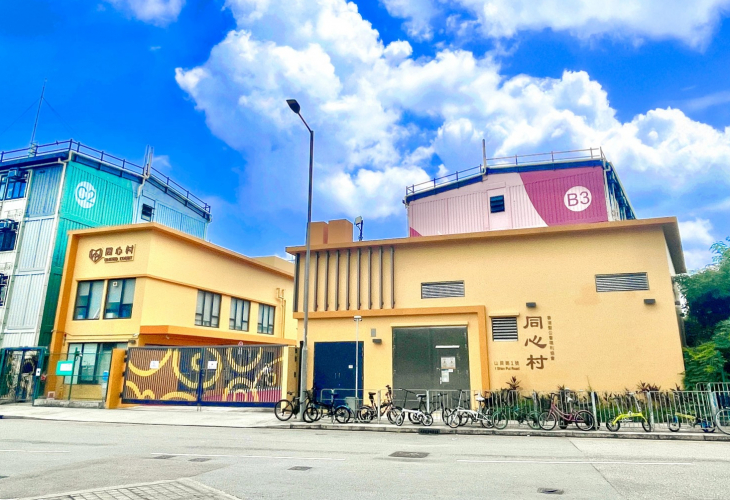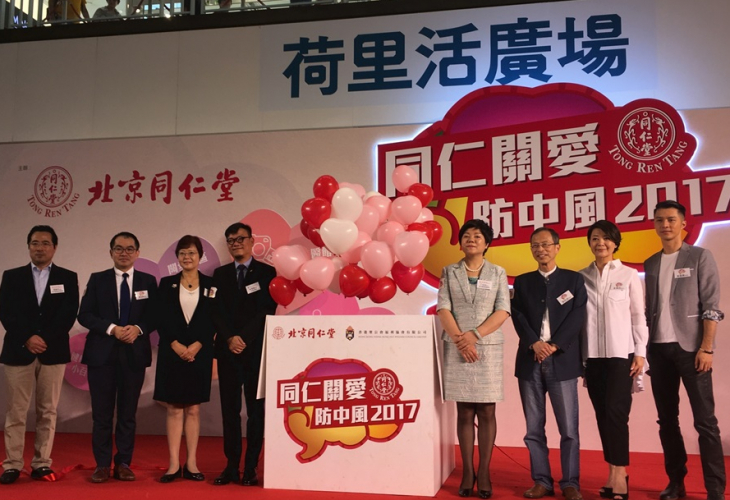
Medical & Wellness Services
Vigilance and Prevention against Stroke Urged by the Welfare Council
The Hong Kong Sheng Kung Hui Welfare Council has been putting considerable effort in providing support services addressing to the needs of stroke patients and their family members. In support of the World Stroke Day on 29th October, 2017, the Welfare Council jointly organised a stroke prevention programme with the Tong Ren Tong at the Plaza Hollywood on 28th October, 2017. The event aims at improving people’s knowledge about stroke and its prevention and treatment, and showing care to stroke patients.
Ms. Ding Yongling, the Deputy Managing Director of Beijing Tong Ren Tang (Group) Company Limited and the General Manager of Beijing Tong Ren Tang Chinese Medicine Company Limited, Mr Joe Sham, Assistant Director of the Hong Kong Sheng Kung Hui Welfare Council, Mr Jasper Tsang, the President of the 4th and 5th Legislative Council, artistes Mr Elaine Jin and Mr Stephen Wong, Ms Li Min, Director of Teaching and Research Division of the Hong Kong Baptist University’s School of Chinese Medicine, and cardiologist Dr David Siu, Professor of the Department of Medicine, Li Ka Shing Faculty of Medicine, HKU attended the ceremony as officiating guests.
Speaking at the event, Mr Joe Sham, Assistant Director of the Welfare Council, felt grateful for the chance to work with the Beijing Tong Ren Tong and looked forward to more collobrations in the future. Ms. Ding Yongling, the Deputy Managing Director of Beijing Tong Ren Tang (Group) Company Limited and the General Manager of Beijing Tong Ren Tang Chinese Medicine Company Limited, hoped the event could arouse public awareness towards stroke and promote the use of traditional Chinese medicine to maximize health benefits.
The organiser also invited Mr Jasper Tsang, former President of Legislative Council, artistes Ms Elaine Jin and Mr Stephen Wong to share their thoughts on the topic and screened a micro-film about stroke for public appreciation. Members and volunteers from the Council’s centres and other groups also put on fantastic shows that lit up the atmosphere!
Please support stroke patients and their beloved ones by making donations to the Sheng Kung Hui Stroke Rehabilitation Charity Fund.
Read
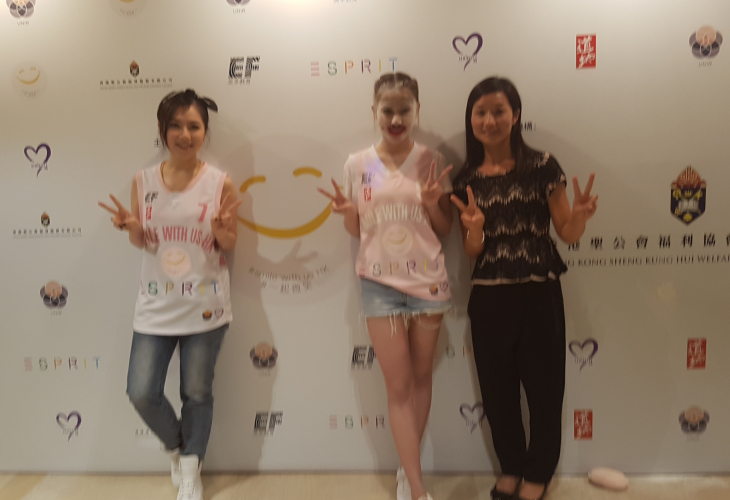
SEN Services
The Welfare Council Received a Donation of HK2 million to Support the SEN Students
The Hong Kong Sheng Kung Hui Welfare Council has launched its services for children with special educational needs (SEN) since 1981. Given its solid experience in SEN services, Smile With Us HK, a voluntary organisation, formed by Ms Laurinda Ho and a group of young people who care about Hong Kong, has donated HK$2 million to support the Council’s Smile Fund to help SEN children.
Ms Seiko Lee, Service Director of the Welfare Council, thanked Smile With Us HK and Laurinda for their generous support for the Smile Fund at a press conference, which would allow 150 SEN students to receive relevant subvented services early. On the other hand, the Welfare Council would continue to provide services to around 40,000 local SEN children in the days ahead.
Laurinda hoped what they have done could draw the public’s attention to needs of SEN students and assist grass-roots families who faced long waiting times for government-subsidised rehabilitation services.
Please like Smile With Us HK’s Facebook page and Instagram! They will be donating HK$10 for every “Like” on Facebook and Instagram.
Read
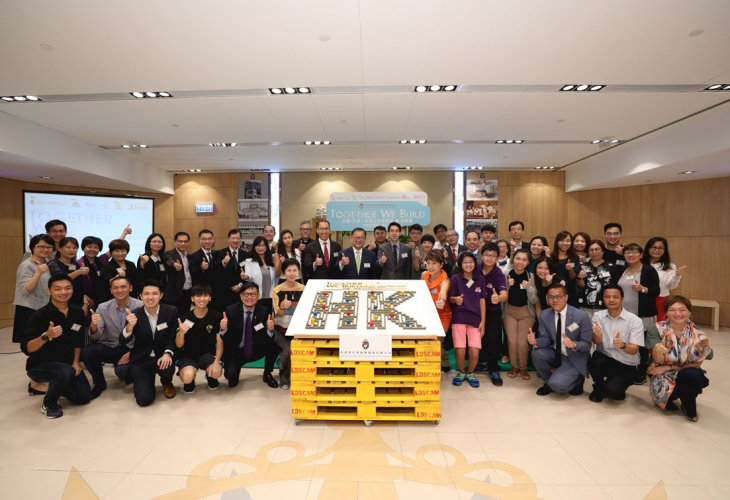
Welfare Council News
Press Conference of the “Together We Build: Community Engagement in Public Space Transformation@SummerFest Lifestyle”
Jointly organised by the Welfare Council, the Central and Western District Office and the Central Venue Management Ltd., and the Central and Western District Council, the “Together We Build: Community Engagement in Public Space Transformation@SummerFest Lifestyle” will be held on the Central Harbourfront Event Space on 25th to 27th August, 2017 for public enjoyment. The event is supported by the Ng Teng Fong Charitable Foundation, Sino Group, Sun Hung Kai Properties, the Sun Hung Kai Properties Charitable Fund, the China Merchants Loscam (Hong Kong) Co. Ltd.— alongside other organisations. On 14th July, 2017, the Welfare Council hosted a press conference at the David Li Kwok Po Community Hall, H.K.S.K.H. St. James’ Church to introduce the event to general public, where 20 mock-up public furniture as well as a life-sized public furniture (2m x 2m x 2m) and a sedan chair were exhibited.
A Speech by Dr Donald Li, Chairman of the Welfare Council Board of DirectorsIn his speech, Dr Donald Li, Chairman of the Welfare Council Board of Directors mentioned, “With architectural design as the main theme, the “Together We Build: Community Engagement in Public Space Transformation@SummerFest Lifestyle” engaged 20 teams of designers and students of architectural and design industries and different institutes to lead service users and members of the public to build a HK-shape giant maze and 20 large pieces of furniture designed according to the theme of “healthy living”. Upon completion of the project, members of the public can interact with others in the maze to share the success of social participation inclusion.” Dr Li felt grateful for the dedicated support of co-organisers, major sponsors and supporting organisations to the event and wished it a great success.
Event Briefing by Dr Jane Lee, Director of the Welfare Council
Dr Jane Lee, Director of the Welfare Council, then briefed attendees on the event’s details. “The event aims at creating an ideal platform for cross-disciplinary collaboration and the enriching of recreational and public spaces in response to the lifestyles and needs of members of the community. The event will also pique the community’s interest in architecture, design and art, and promote the spirit of social harmony,” Dr Lee said.
Dr Lee added that the event would gather 2,000 participants to build a HK-shaped giant outdoor maze of 5,000 m2. The maze would include 20 large-sized public furniture featuring activities with healthy lifestyle designed by different service users and designers, reflecting the creativity of individuals of different backgrounds and various needs of the community. A sedan chair race would be held at the event. The sedan chairs of the race would be made to be components of a piece of public furniture. Participants could team up for an exciting sedan chair racing around the maze. Besides, a variety of DIY workshops and activities would be organised for public enjoyment.
Mr Robert Wong, Project Development Director of the Welfare Council, Shared on the Concept of Social Participation Inclusion
“People and the community are considered to be livelihood issues of concern to the general public. However, they are considered to be fundamental to architectural projects. It is a traditional mindset that architectural teams should play a key role in architectural design while users’ participation is not a must. Still, the Welfare Council incorporated participatory and person-oriented design to form a platform where service users can get involved in the process so as to achieve a better outcome in architectural design,” Wong said.
Wong also noted that the Council’s design team would host seminars and design workshops, and take service users to do site visit and teach them to produce mock-up public furniture so as to inspire their creativity and exchange views with them. Through Together We Build: Community Engagement in Public Space Transformation@SummerFest Lifestyle, the Council hoped to stand out the concept of community engagement, which means to invite service users to take part in the design process and break free from the traditional frame work of architectural design.
Cheque Presentation Ceremony
The generous support of our major sponsors including the Ng Teng Fong Charities Foundation, Sino Group, Sun Hung Kai Properties and the Sun Hung Kai Properties Charitable Fund also facilitate the event’s smooth operation. A cheque presentation ceremony was held at the press conference, where Mr Daryl Ng, Executive Director of Sino Group, and Mr Adam Kwok, Executive Director of Sun Hung Kai Properties, presented a HK$1.5 million cheque respectively to the Welfare Council representatives, Dr Donald Li and Dr Jane Lee.
Kick-off Ceremony
Accompanied by Dr Donald Li and Dr Jane Lee, seven guests including Mr Daryl Ng, Mr Adam Kwok, Ms Susanne Wong, District Officer (Central & Western) of Home Affairs Department, Ms Michelle Lee, Director of Sales and Marketing for the Central Harbourfront Event Space, and Ms Ting Xu, Head of Sales Management, China Merchants Loscam, officiated at the kick-off ceremony. Counting to three, guests put the props to form a mini HK shaped maze. The kick-off ritual represented that the joint efforts from all sides would contribute to the success of the event. The finished model is one-hundredth of the size of the original maze.
Sharing SessionThe organiser invited a design team formed by HKU SPACE architectural studies students and two service users including Ms Law and Ms Fung from the Welfare Council’s elderly centres to share their thoughts on the project. The design team has co-designed one of the large piece of public furniture, and they agreed that the project gave them an exclusive chance to exchange ideas and work together to create a beautiful yet practical furniture. Mr Yeung, a student of the design team, thought the project did not only let them make best use of the summer holidays and contribute the community from what they have learnt at school but also gave them an opportunity to partner and brainstorm with service users so as to perfect the design. Also, Ms Law never thought she would become a “designer” to design large-sized furniture for the centre. She just couldn’t wait to see the final product and try it with other senior citizens.
After the ceremony, guests toured the mock-up public furniture and 20 mini models while designers and service users shared their design concepts and thoughts with one another.
Hong Kong people are welcome to participate in the “Together We Build: Community Engagement in Public Space Transformation@SummerFest Lifestyle”. For enrolment methods and event details, please visit the event’s website: www.webuild.skhwc.org.hk or call Ms Fung at 2533 1209. To keep abreast of the latest updates on the event, check out Together We Build Facebook page (Together we build_Skhwc).
Read
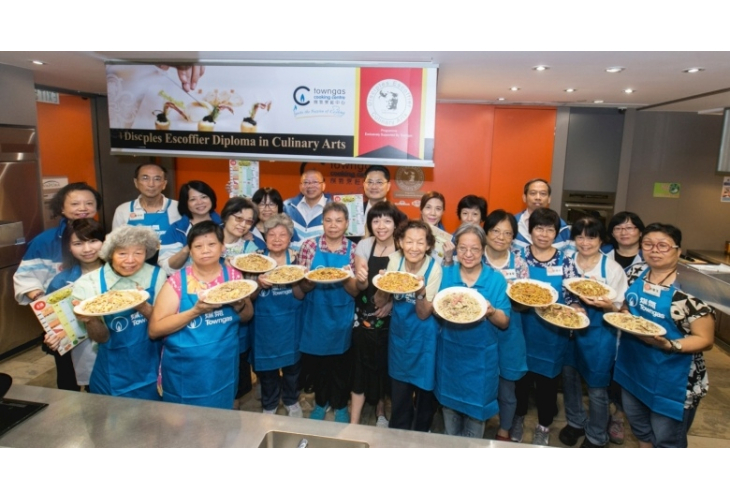
Elderly Services
Hong Kong’s First Procedural Learning Method in Cooking Helps Slow Down Cognitive Decline
A Collaborative Cooking Programme, “Chef Anchor”, Launched by the Hong Kong Sheng Kung Hui Welfare Council and Hong Kong and China Gas Company Limited Improved 90% of Participants’ Cooking Skills and Self-care Ability
In Hong Kong, approximately 9 out of 100 elderly people over 70 years old suffer from mild cognitive impairment (MCI). Ten to 15% of patients with MCI could become affected by dementia within the first year of the onset of MCI. At this moment, there is no complete cure for dementia which could affect patients physically, psychologically and socially but early intervention, appropriate treatments and aids could help delay deterioration of the disease. In light of this, the Hong Kong Sheng Kung Hui Welfare Council and Hong Kong and China Gas Company Limited (Towngas) launched the “Chef Anchor”, the first collaborative cooking programme designed by the Welfare Council’s occupational therapists and Towngas’s cooking instructors to offer training to MCI participants to alleviate their symptoms. Research results showed that 90% of MCI participants saw improvements on self-confidence, cooking skills and cognitive ability after completion of the first phase of “Chef Anchor”. On 8th June, 2017, the “Chef Anchor” sharing session was held at the Towngas Cooking Centre to brief attendees on the programme details and research results, with a view to raising the public’s knowledge about MCI while helping patients cope with daily life and fostering social interaction. A song using the melody of Towngas’s commercial theme song with new lyrics regarding cooking safety was composed. Participants were required to sing the song every session. The objective of this practice was to provide cognitive training and rebuild participants’ self-confidence in cooking.
Mr Joe Sham, Assistant Director of the Welfare Council, and Mr Issac Yeung, Towngas Head of Corporate Affairs, officiated at the sharing session, where the organiser announced the research results of the first phase of “Chef Anchor”. After completion of Phase 1, the Welfare Council surveyed 19 MCI participants and found that the procedural learning method in cooking helped improve their self-confidence, cooking skills and cognitive ability so that their abilities to follow cooking instructions could be enhanced. Most participants thought that the programme increased their confidence in cooking as well as helped them avoid mistakes, including forgetting steps and leaving the stove on. Research findings also revealed that the cognitive screening test results of about 90% of MCI participants were improved, reflecting that their cognitive ability was enhanced by the programme.
In his welcome remarks, Mr Joe Sham, Assistant Director of the Welfare Council, felt delighted to cooperate with Towngas on “Chef Anchor” cooking programme and targeted to extend the programme to cover more senior citizens with MCI. “As there are no major differences between MCI and normal ageing, MCI patients usually refuse to accept their problems and receive treatments. “Chef Anchor” combined cooking with occupational therapies, using procedural learning method in flame cooking to offer authentic cognitive training to participants. Not only did such training method increased participants’ confidence in cooking, it can also be applied to other facets of life so as to enhance participants’ overall cognitive ability and thus improve their quality of life”, he added.
At the sharing session, Mr Issac Yeung, Towngas Head of Corporate Affairs, shared, “The collaborative cooking programme—“Chef Anchor”—aims at improving MCI participants’ self-confidence and cognitive ability via cooking. Towngas would like to offer our specialty, flame cooking, to help MCI patients and create shared value. We also encouraged our staff and clients to assist participants during cooking classes in order to enrich their knowledge about the disease and to empower them to serve themselves, as well as others.”
Dr Adrian Wong, Research Assistant Professor and Clinical Psychologist at the Division of Neurology, Department of Medicine and Therapeutics at CUHK, also shared on the topic of how procedural learning method could help patients with MCI. Adrian agreed that a detailed breakdown of cooking could help train participants’ cognitive ability. Ms Charis Wong, Occupational Therapist I of the Welfare Council, and Ms Pauline Wong, Manager of Towngas Cooking Centre, illustrated the design of Chef Anchor. “Unlike other recipes, we had further broken down the steps of our task-analyzed recipes which feature colours, words and image explanations for easy understanding and safety purpose, making MCI participants enjoy the fun of flame cooking”, Pauline said. Ms Charis Wong, Occupational Therapist I of the Welfare Council, explained that MCI participants were weak at thinking and analyzing and they needed more time in receiving new messages. However, common recipes with complicated steps required users to think quickly and analyze so as to complete the tasks. Mr Chan, a 90-year-old participant, also shared his experience at the cooking programme. Chan told that he seldom cooked due to poor health while meal delivery services were arranged for him by the elderly centre. But after joining the programme, he acquired cooking skills again and regained fun and confidence in cooking. Cindy, Towngas’s volunteer, thought that she has learnt more about the life challenges of senior citizens with MCI as well as their difficulties in remember things so she would communicate with them patiently. She also gained satisfaction while working with them in the programme.
Hong Kong’s First Multi-disciplinary Procedural Learning Method in Cooking Designed for MCI Participants
“Chef Anchor” is a multi-disciplinary programme launched by the social welfare sector and business sector. In March 2017, the Welfare Council conducted a cognitive screening test for hundreds of senior citizens from its elderly centres. The senior citizens with the tendency of MCI and had difficulties in cooking were invited to join the programme. Phase one and Phase two of “Chef Anchor” have been completed so far.
“Chef Anchor” is a systematic programme featuring the following four steps to delay cognitive decline of elderly people:
Occupational therapists and social workers of the Welfare Council designed authentic cognitive training for MCI participants, and provided cognitive screening test to them.
Occupational therapists and social workers of the Welfare Council and Towngas cooking instructors and graphic designers worked together to tailor-make the task-analyzed recipe. This recipe featured all necessary ingredients for the dish with cooking procedures written in simple, concise and clear wordings. Safety instruction, colours, words and image explanations were also used for easy understanding and safety purpose.
Occupational therapists and social workers of the Welfare Council would give appropriate support to MCI participants and Towngas’s volunteers.
Read
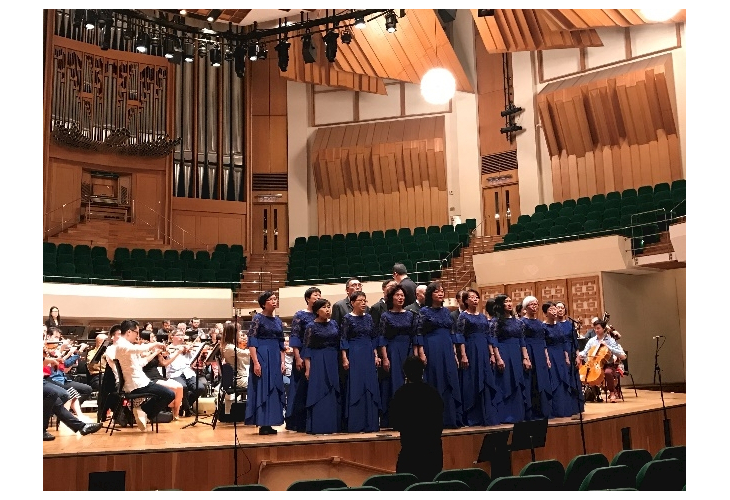
Elderly Services
The Central Choir of the Vitalia Academy for Life Long Learning Singing St. Francis' Prayer for Peace with the accompaniment of the Hong Kong Philharmonic Orchestra
“O Master, grant that I may never seek so much to be consoled, as to console, to be understood, as to understand, to be loved, as to love with all my soul…”
Thanks to Mr Robert Shum, Independent Director of the Welfare Council Board of Directors, for bringing the Vitalia Academy for Life Long Learning and Ms Ming Lie, Barrister-at-law, together. With the support of Ms Lie, who is also a fundraising committee member of the Hong Kong Philharmonic Orchestra Fundraising Concert 2017, the Central Choir of the academy got a chance to perform the Council’s song, “St. Francis’ Prayer”, for a thousand of guests at the Hong Kong Philharmonic Orchestra Fundraising Concert 2017, with the orchestral accompaniment, at the night of 25th March, 2017.
Through multiple trainings and activities, the academy’s Central Choir has cultivated senior citizens’ interest and skills in singing, sending joy to people round the corner with beautiful songs. The Central Choir has been formed since 2004, which includes 20 members from 13 elderly centres of the Welfare Council. Although the Central Choir has rich performing experiences and is widely recognized, it truly treasured the once-in-a-lifetime chance given by the Hong Kong Philharmonic Orchestra and Ms Lie. The valuable experience did not only push members of the Central Choir to learn their weaknesses and keep improving but also helped promote the importance of lifelong learning, which is in line with the mission of the academy: empowering retirees through incomparable learning experiences.
Read
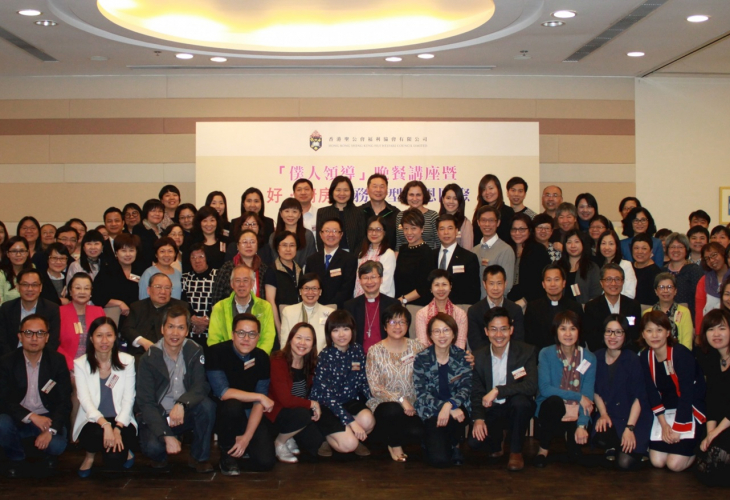
Social Enterprises
Guests and staff joined together to celebrate the future of the Good Kitchen
In response to our ever-changing social and economic environment, the Hong Kong Sheng Kung Hui’s social enterprise, Good Kitchen, has adjusted its operation strategies and has transformed its catering business into food manufacturing since 1st May, 2017. To deliver its heartfelt gratitude to the support from various sectors, the Welfare Council hosted a thanksgiving dinner cum “Servanthood Leadership” dinner series, “Holding on and letting go” on 28th April, 2017. A total of 123 guests, friends and staff joined together to look back at the wonderful moments and celebrate the future of the Good Kitchen as well as learn the spirit of servanthood leadership on this eventful night.
The Welfare Council invited Ms Florence Hui, Under Secretary for Home Affairs, the Rt Revd Andrew Chan, Bishop of the H.K.S.K.H. Diocese of Western Kowloon and The Revd Kenneth Lau, Chaplain of the Welfare Council, as the officiating guests of the Ceremony to celebrate the Good Kitchen’s new mode of operation. Accompanied by Dr Jane Lee, the Director of the Hong Kong Sheng Kung Hui Welfare Council, 3 guests put the labels – “Healthy”, “Environmental-friendly”, “Innovative” and “Caring” respectively into a basket filled with fresh and healthy food, suggesting the Good Kitchen will continue to create healthy and fresh dishes while promoting and extending the messages of “Healthy”, “Environmental-friendly”, “Innovative” and “Caring”.
In her opening remarks, Dr Jane Lee, Director of the Welfare Council, said, “Such transformation is to prepare for the Good Kitchen’s future development. It is always hard to say goodbye but I believe that it is not the end of the story but a new chapter of the Good Kitchen. I am sure that the Good Kitchen is ready for new challenges and I hope you will continue to support the Good Kitchen. I also want to thank the community for their generous support for the Good Kitchen by making donations or working with the it on various community projects.”
Also, Dr Lee mentioned that the dinner series has always been a well-received programme held at the Good Kitchen, where Father Thomas Kwan, the Rt Revd Andrew Chan and the Rt Revd Dr Timothy Kwok were invited to share the theory of spiritual management with participants. She felt grateful for the leadership of them and Father Thomas Kwan for hosting the Servanthood Leadership dinner series in that evening. Dr Lee then presented the Awards of Appreciation to the partners and staff of the Good Kitchen in recognition of their effort and contribution all along.
A keynote speaker of the dinner series, Father Thomas Kwan, is the Honorary Professional Consultant of the Hong Kong Institute of Educational Research, CUHK as well as the Welfare Council’s Spiritual Development Consultant. Father Kwan’s views on holding on and letting go were inspiring and the participants found the experience physically and spiritually fulfilling. At the end of the dinner, guests and employees grasped the final opportunity to capture the precious moments of the Good Kitchen, filling the night with warmth and happiness.
30th April was the last operation day of the Good Kitchen before moving on to a new stage. The Good Kitchen team shared sentiments of regret but the team still served every customer with heart and dedication. On that day, Mr Joseph Man, Deputy Director of the Welfare Council led a group of staff of the Welfare Council’s headquarters to visit the Good Kitchen and say thank you to the Good Kitchen team. Staff also shared how the Good Kitchen established and experiences to conclude the afternoon.
Good Kitchen will move forward.
Blessing by the Rt Revd Andrew Chan to the Good Kitchen:
May the Lord give us the ability to hold on and the courage to let go;
the wisdom to hold on and the depth to let go;
the perservance to hold on and the bravery to let go;
the determinedness to hold on and the spiritual strength to let go.
May the Lord show us the meaning of life, truth and His will in holding on and
letting go.
The Past and Future of the Good Kitchen
Founded in 2013, the Good Kitchen was the first Chinese eatery in the form of social enterprise that has been actively promoting caring to underprivileged groups, healthy eating, eco-friendliness and innovative social services while maintaining high standards of food quality, attracting compliments from celebrities and gourmets as well as wide media coverage. Fulfilling its social responsibilities, the Good Kitchen was well-recognized by the public.
Collaboration with Various Organisations
Over the past few years, the Good Kitchen has promoted a number of service schemes to support the underprivileged members of society, persons undergoing rehabilitation, ex-offenders and female immigrants from the mainland. Besides, it has worked with the S.K.H. Holy Carpenter Church Community Centre to provide an internship programme to seniors, which increased their chances of rejoining the workforce. Events such as work shadowing programmes, tours to social enterprises, parenting talk and the local food feast also held at the Good Kitchen.
Caring for Society
Unlike regular takeout, the Good Kitchen has advocated eco-friendly eating habits. With the sponsorship of the DBS Social Enterprise Advancement Grant, new services including “Meals for Good” and “Soup for Good” were launched to offer enterprises in the surrounding districts nutritious lunches and double-boiled soup, helping workers establish healthy and eco-friendly eating habits. The Good Kitchen also launched its Suspended Meal Scheme. Empowered by donations from various sectors, it offered meal coupons to low-income individuals so they could enjoy free lunches at the Good Kitchen. In a show of corporate responsibility, the Good Kitchen co-organized varied charity movements with a number of corporations, which included to host the “Good Spirit” caring activity with the Henderson Land Development Company Limited and bring festive foods to households on Comprehensive Social Security Assistance, street sleepers, persons undergoing rehabilitation, immigrants from the mainland and singleton elderly so they could feel the love and care of society.
Ready for New Challenges
Backed by profound experience in the industry, the Good Kitchen is well prepared for new challenges ahead. Currently, the food factory has started operation. In addition to providing nutritious lunch boxes and soup, catering services, festive foods and food manufacturing, the Good Kitchen will continue to offer job opportunities and training to the underprivileged groups. Please support the Good Kitchen! For any sales enquiry, please contact us via the following ways:
Good Kitchen
Tel: 2541 7031 (Ms Ching/Ms Tse)
Email: gk@skhwc.org.hk
Facebook: www.facebook.com/goodkitchen500
Fax: 2752 7382
Website: www.goodkitchen.com.hk
Address: Flat 3A, 4/F, Hoi Luen Industrial Centre, Hoi Yuen Road, Kwun Tong, Kowloon
Read
Join our mailing list
Get the latest news about our services, life-transforming stories and how you can make a difference
*By clicking the "Subscribe" button, you agree to the Welfare Council's disclaimer and privacy policy


